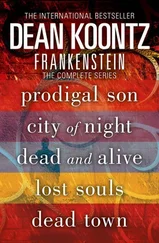Sitting at the desk, Celestina phoned her parents again. She shook uncontrollably, but her voice was steady.
Her mother and father used different extensions, both on the line with her.
“I want you to adopt the baby.” Before they could react, she hurried on: “I won't be twenty-one for four months yet, and even then they might give me trouble about adopting, even though I'm her aunt, because I'm single. But if you adopt her, I'll raise her. I promise I will. I'll take full responsibility. You don't have to worry that I'll regret it or that I'll ever want to drop her in your laps and escape the responsibility. She'll have to be the center of my life from here on. I understand that. I accept it. I embrace it."
She worried that they would argue with her, and though she knew that she was committed to her decision, she was afraid to have that commitment tested just yet.
Instead, her father asked, “Is this emotion talking, Celie, or is this brain as much as heart?"
“Both. Brain and heart. But I've thought it through, Daddy. More than anything in my life, I've thought this through."
“What aren't you telling us?” her mother pressed, intuiting the existence of a larger story, if not the amazing nature of it.
Celestina told them about Nella Lombardi and about the message Phimie delivered to Dr. Lipscomb after being resuscitated. “Phimie was, . . so special. There's something special about her baby, too."
“Remember the father,” Grace cautioned.
And the reverend added, “Yes, remember. If blood tells-"
“We don't believe it does, do we, Daddy? We don't believe blood tells. We believe we're born to hope, under a mantle of mercy, don't we?"
“Yes,” he said softly. “We do.
A siren in the city wailed toward St. Mary's. An ambulance. Through streets bustling with hope, always this lament for the dying.
Celestina looked up from the scarred top of the desk toward the fog-white sky beyond the window, from reality to the promise.
She told them of Phimie's request that the baby be named Angel. “At the time, I assumed she wasn't able to think clearly because of the stroke.
If the baby was going to be adopted out, the adoptive parents would name it. But I think she understood—or somehow knew-that I would want to do this. That I would have to do this."
“Celie,” her mother said, “I'm so proud of you. I love you so much for wanting this. But how is it possible to carry on with your studies, your work, and take care of a baby?"
Celestina's parents weren't well-off. Her father's church was small and humble. They managed to worry up tuition for art school, but Celestina worked as a waitress to pay for her studio apartment and other needs.
“I don't have to graduate in the spring of next year. I can take fewer classes, graduate the spring after. That's no big deal."
“Oh, Celie—"
She rushed on: “I'm one of the best waitresses they have, so if I ask for dinner shifts only, I'll get them. Tips are better at dinner. And working the one shift, four and a half to five hours, I'll have a regular schedule."
“Then who'll be with the baby?"
“Sitters. Friends, relatives of friends. People I can trust. I can afford sitters if I'm getting only dinner tips."
“Better we should raise her, your father and me."
“No, Mom. That won't work. You know it won't."
The reverend said, “I'm sure you underestimate my parishioners, Celestina. They won't be scandalized. They'll open their hearts."
“It isn't that, Daddy. You remember, when we were all together the day before yesterday, how afraid Phimie was of this man. Not just for herself ... for the baby."
I won't have the baby here. If he realizes he made a baby with me, it'll
make him crazier I know it will.
“He won't harm a little child,” her mother said. “He wouldn't have any reason."
“If he's crazy and evil, then he doesn't need a reason. I think Phimie was convinced he'd kill the baby. And since we don't know who this man is, we have to trust her instincts."
“If he's such a monster, then if he ever learns about the baby,” her mother worried, “maybe you won't be safe even in San Francisco."
“He'll never know. We have to make sure he never knows."
Her parents were silent, contemplating.
From the corner of the desk, Celestina picked up a framed photo of the social worker and her family. Husband, wife, daughter, son. The little girl smiled shyly through braces. The boy was impish.
In this portrait, she saw a bravery beyond words. Creating a family in this turbulent world is an act of faith, a wager that against all odds there will be a future, that love can last, that the heart can triumph against all adversities and even against the grinding wheel of time.
“Grace,” the reverend said, “what do you want to do?"
“This is a hard thing you're putting on yourself, Celie,” her mother warned.
“I know."
“Honey, it's one thing to be a loving sister, but there's a world of difference between that and being a martyr."
“I held Phimie's baby, Mom. I held her in my arms. What I felt wasn't just sentimental gush."
“You sound so sure."
great “When hasn't she, since the age of three?” her father said with affection.
“I'm meant to be this baby's guardian,” Celestina said, “to keep her safe. She's special. But I'm no selfless martyr. There's joy in this for me, already at just the thought of it. I'm scared, sure. Oh, Lord, am I scared.
But there's joy, too."
“Brain and heart?” her father asked again.
“All of both,” she confirmed.
“What I insist upon,” said her mother, “is coming down there for a few months at the beginning, to help out until you get organized, until you figure out the rhythm of it."
And thus it was agreed. Although sitting in a chair, Celestina felt herself crossing a deep divide between her old life and her new, between the future that might have been and the future that would be.
She was not prepared to raise a baby, but she would learn what she needed to know.
Her ancestors had endured slavery, and on their shoulders, on the shoulders of generations, she now stood free. What sacrifices she made for this child could not rightly be called sacrifices at all, not in the harsh light of history. Compared to what others had undergone, this was easy duty-, generations had not struggled so that she could shirk it. This was honor and family. This was life, and everyone lived his life in the shadow of one solemn obligation or another.
Likewise, she wasn't prepared to deal with a monster like the father, if one day he came for Angel. And he would come. She knew. In these events as in all things, Celestina White glimpsed a pattern, complex and mysterious, and to the eye of an artist, the symmetry of the design required that one day the father would come. She wasn't prepared to deal with the creep now, but by the time that he arrived, she would be ready for him.
AFTER UNDERGOING TESTS for brain tumors or lesions, to ascertain whether his seizure of violent emesis might, in fact, have a physical cause, Junior was returned to his hospital room shortly before noon.
No sooner was he abed once more than he cringed at the sight of Thomas Vanadium in the doorway.
The detective entered, carrying a lunch tray. He put it on the adjustable bed stand, which he swung over Junior's lap.
“Apple juice, lime Jell-O, and four soda crackers,” said the detective. “If you don't have enough of a conscience to make you confess, then this diet ought to break your will. I assure you, Enoch, the fare is far better in any Oregon prison."
“What's wrong with you?” Junior demanded.
As though he'd not understood that the question required a reply and had not heard the implied rebuke, Vanadium went to the window and raised the venetian blind, admitting such powerful sunlight that the glare seemed to crash into the room.
Читать дальше











